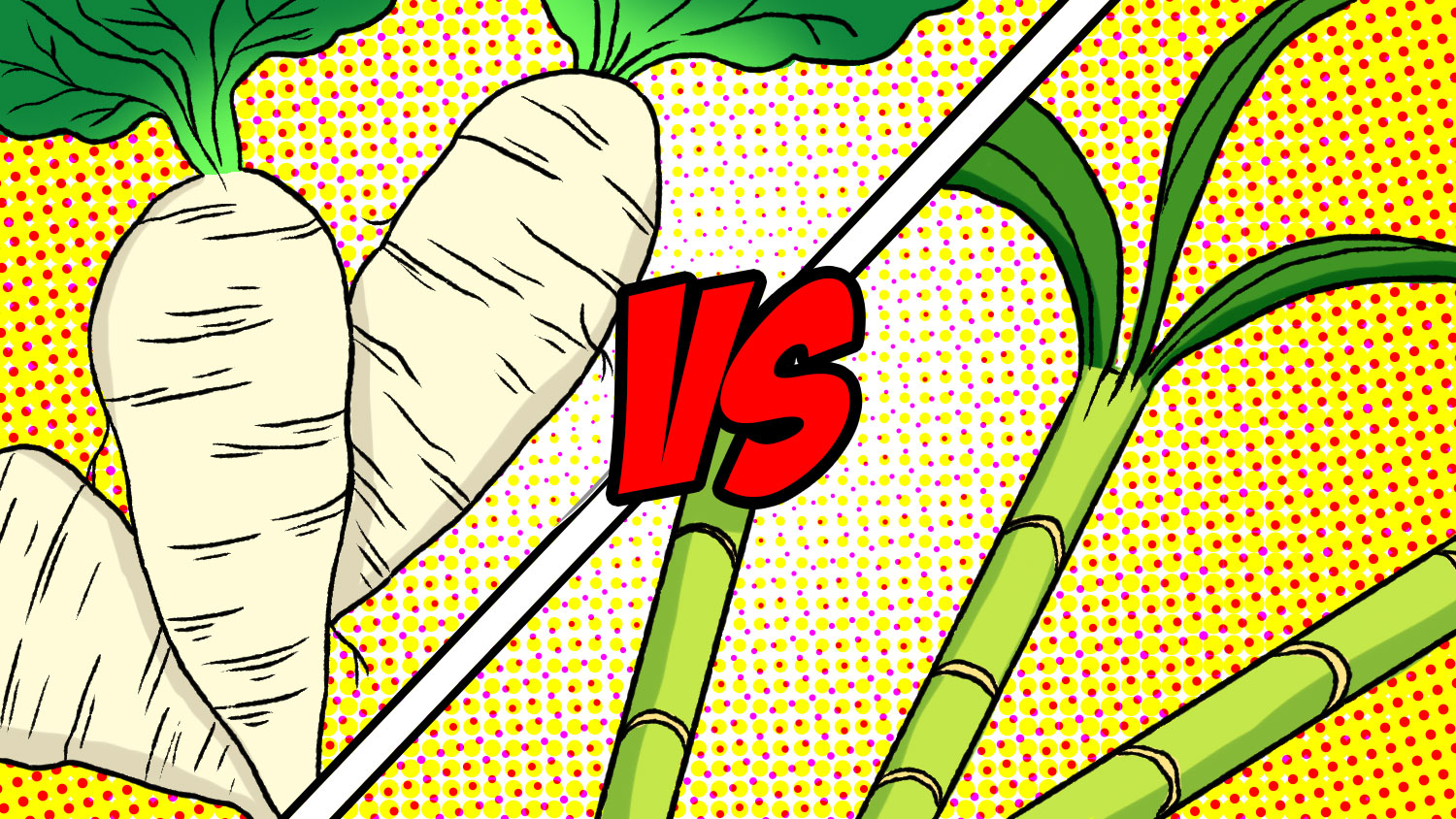The Great Discussion: Sugar Beet Vs Sugar Cane - Which Is the Superior Choice for Sugar?
The dispute over sugar beet versus sugar cane as the favored sweetener entails a number of essential factors. Each deals distinctive benefits and challenges pertaining to production, taste, and health implications. While sugar beet may interest those prioritizing sustainability, sugar cane has its own cultural and culinary importance. As customers become extra mindful of their selections, the question continues to be: which sugar truly sticks out in today's market?
The Beginnings of Sugar Beet and Sugar Cane
Although sugar cane has actually been cultivated for hundreds of years, mostly in exotic regions, sugar beet became a substantial alternative in cooler climates during the 18th century. Sugar cane, indigenous to Southeast Asia, was first trained around 8000 BCE and spread globally through trade and expedition. Its high sucrose material made it an important crop, resulting in considerable plantations in areas like the Caribbean and Brazil.
On the other hand, sugar beet was initial cultivated in the Mediterranean around the 18th century, especially getting grip in Europe as a response to sugar cane shortages. The plant thrives in warm climates, making it ideal for regions with cooler weather. The discovery that sugar can be drawn out from beet roots reinvented sugar manufacturing, specifically during the Napoleonic Wars when trade restrictions minimal cane sugar access. The increase of sugar beet cultivation noted a crucial minute in the history of sugar, giving a regional resource for numerous countries.
Manufacturing Processes: From Field to Sweetener
The manufacturing procedures of sugar beet and sugar cane reveal considerable distinctions in farming strategies, harvesting methods, and improvement stages. Recognizing these subtleties is essential for appreciating exactly how each plant adds to the total sugar market. This comparison highlights the one-of-a-kind characteristics and challenges related to both resources of sweet taste.

Growing Techniques Comparison
Growing strategies for sugar beet and sugar cane disclose distinct methods that influence their production procedures, from field prep work to last sugar removal. Sugar beet farming normally entails raking and traumatic to create a fine seedbed, followed by seeding in rows to help with growth. This crop advantages from cooler environments and is commonly grown in springtime. In comparison, sugar cane is normally planted in furrows with pre-sprouted cane pieces, needing a warm, tropical climate for perfect growth. Cane fields are frequently laid out to manage water efficiently, offered its demand for considerable watering. Both plants are taken care of with certain fertilizing and insect control methods customized to their development environments, affecting yield top quality and performance in sweetener removal.

Collecting Techniques Discussed
Efficient collecting techniques for sugar beet and sugar cane play a crucial duty in assuring maximum yield and quality of the end product. Sugar beet harvesting usually utilizes mechanical origin farmers, which successfully root out the beets from the dirt and different them from the vegetation. This approach lessens damage to the beetroots and minimizes labor expenses. On the other hand, sugar cane harvesting may utilize either manual work or machinery, depending on the area and scale of manufacturing. Mechanical harvesters reduced the cane at the base and commonly strip away the fallen leaves, enhancing the process for larger areas. Both techniques require mindful timing to ensure the plants are gathered at peak sweet taste, influencing the quality of the last sweetener item.
Refinement Process Distinctions
While both sugar beet and sugar cane undertake extensive refinement processes to change their raw types right into functional sweeteners, the methods utilized vary significantly. Sugar beet improvement begins with cleaning and cutting the beets right into slim cossettes, complied with by diffusion, where warm water extracts sucrose. The resulting juice is after that cleansed, focused, and crystallized. On the other hand, sugar cane processing includes squashing the stalks to remove juice, which is then made clear using lime and warm to get rid of impurities. The cane juice is vaporized to form syrup prior to crystallization. Eventually, while both procedures intend to produce white sugar, the unique techniques highlight the special characteristics of each source and their ramifications for taste and pureness in the end product.
Nutritional Profiles: What's in Your Sweetener?
The dietary accounts of sugar beet and sugar cane present unique distinctions worth taking a look at. This contrast includes facets such as calorie material, mineral and vitamin existence, and variations in glycemic index. Understanding these aspects can provide insights into exactly how each sugar might influence total health.
Caloric Content Contrast
Understanding the caloric content of sugar beet and sugar cane is necessary for those conscious of their nutritional options. Both sweeteners mainly contain sucrose, contributing a similar caloric value. Typically, sugar beet contains around 387 calories per 100 grams, while sugar cane has concerning 390 calories per the very same quantity. The minor difference in caloric material may not significantly impact most diets; however, it is remarkable for those carefully checking their caloric intake. Additionally, both sugar resources supply energy however lack important nutrients, making them mainly sources of vacant calories. People seeking much healthier options might desire to take into account these variables when selecting between sugar beet and sugar cane as their liked sweetener.
Mineral and Vitamin Web Content
Caloric material gives only a component of the image when evaluating sugar beet and sugar cane. Both sources of sugar differ noticeably in their mineral and vitamin profiles. Sugar beets are extremely abundant in necessary check my site nutrients, consisting of potassium, magnesium, and iron. They likewise consist of small amounts of vitamins such as B6 and folate, adding to their nutritional worth. On the other hand, sugar cane provides a different collection of advantages, containing calcium, phosphorus, and traces of B vitamins. While neither alternative is a significant resource of vitamins and minerals compared to whole foods, sugar beets might have a small edge because of their greater mineral web content. Inevitably, customers looking for dietary gain from sweeteners ought to think about these distinctions in accounts.
Glycemic Index Distinctions
Glycemic index plays a necessary role in evaluating how different sweeteners impact blood glucose levels. Sugar beet and sugar cane exhibit noteworthy differences in their glycemic actions. Normally, sugar beet has a reduced glycemic index contrasted to sugar cane, causing a slower and steadier rise in blood glucose levels after consumption. This characteristic may make sugar beet a preferable choice for individuals handling diabetic issues or those seeking to maintain stable power levels. On the other hand, sugar cane tends to create an extra fast spike in blood glucose, which might result in quicker power accidents. Comprehending these Our site differences is significant for customers intending to make educated nutritional options concerning sweeteners and their influence on general health and wellness.
Environmental Impact: Sustainability Considerations
While both sugar beet and sugar cane are essential resources of sugar, their environmental impacts and sustainability factors to consider differ considerably. Sugar beetroots, primarily grown in warm areas, usually call for less water and can be cultivated in diverse environments. They additionally take advantage of crop turning practices, which boost soil health and lower the requirement for synthetic plant foods. Extensive farming of sugar beets can lead to dirt depletion and chemical use.
In comparison, sugar cane flourishes in exotic environments and commonly necessitates significant water resources for watering (Sugar beet vs sugar cane). The monoculture nature of sugar cane farming can intensify dirt erosion and biodiversity loss. In addition, the burning of cane fields prior to harvest releases carbon discharges and adds to air pollution. Both plants face difficulties related to environment change, however their varying cultivation methods greatly influence their total sustainability profiles. The option in between sugar beet and sugar cane entails evaluating these ecological impacts thoroughly.
Preference and Culinary Makes Use Of: Which Sugar Reigns Supreme?
The choice between sugar beet and sugar cane expands past environmental considerations to include preference and cooking applications. Sugar beet, often perceived as having a slightly various taste account, often tends to be much less sweet than sugar cane. This subtle difference can influence its use in recipes, especially in baked products where a neutral sweet taste is preferred.
Alternatively, sugar cane is commemorated for its distinctive, abundant, and more complex flavor, making it a preferred choice for beverages and desserts - Sugar beet vs sugar cane. Its natural molasses content can enhance the depth of tastes in numerous dishes
In cooking, sugar cane's versatility shines via in sauces, lusters, and confections, while sugar beet is generally found in processed foods and sugar like granulated sugar. Ultimately, the choice between both sugar frequently pivots on individual taste preferences and specific culinary applications, with each offering unique benefits in the kitchen.
Wellness Ramifications: Sugar Beet Vs Sugar Cane
Both sugar beet and sugar cane have distinct health and wellness implications that can affect consumer choices. Sugar beet vs sugar cane. Sugar beet is frequently regarded for its higher fiber material, which can help digestion health. In addition, it has specific anti-oxidants that might add to general health. On the various other hand, sugar cane click reference is abundant in nutrients such as calcium, potassium, and magnesium, providing some mineral advantages
Both resources primarily are composed of sucrose, which can lead to similar health and wellness issues when eaten exceedingly, such as weight problems, diabetes mellitus, and heart disease. The handling methods additionally differ; sugar beet is usually refined extra intensively, potentially causing a loss of certain nutrients. Customers concerned regarding additives might prefer sugar cane, as it commonly undergoes less handling. Ultimately, recognizing these health and wellness effects can direct individuals towards making educated choices concerning their sugar choices.
Consumer Preferences: Fads and Insights
Customer choices for sweeteners have advanced significantly over the last few years, affected by health and wellness trends, environmental problems, and nutritional options. Boosted recognition of the negative health and wellness impacts linked with extreme sugar intake has led several consumers to look for choices. This shift has actually motivated a growing interest in natural sugar, with sugar beet and sugar cane being at the forefront of discussions.
Study shows that consumers are progressively favoring sugar beet because of its regarded environmental benefits, as it is commonly expanded closer to processing plants, minimizing transport discharges. On the other hand, sugar cane is typically connected with tropical regions and might bring understandings of sustainability difficulties.

Regularly Asked Questions
How Do Sugar Beet and Sugar Cane Affect Blood Sugar Levels?
Sugar beet and sugar cane both consist of sucrose, which can boost blood sugar degrees. The influence largely relies on specific metabolic process and consumption quantities, yet both sources contribute similarly to blood sugar reactions in many cases.
Which Sugar Is Better for Cooking and Cooking?
When reviewing sugar for cooking and cooking, one must take into consideration texture, taste, and wetness retention. Sugar beet and sugar cane both offer one-of-a-kind high qualities, with sugar cane frequently preferred for its richer flavor account in cooking applications.
Can Sugar Beet or Cane Be Utilized in Vegan Diets?
Both sugar beet and sugar cane can be used in vegan diet regimens. They are plant-derived sweeteners, making them appropriate for individuals looking for vegan-friendly options without animal items, guaranteeing moral options in their cooking methods.
What Are the Historic Uses Sugar Beet and Cane?
Historically, sugar beet and cane acted as necessary sources of sweetness, with cane grown in tropical areas and beet in pleasant zones. Both have actually been essential to numerous cultures, economic situations, and culinary traditions throughout history.
Exist Any Kind Of Alternatives to Sugar Beet and Cane?
Alternatives to sugar beet and cane include agave nectar, honey, maple syrup, and fabricated sugar like aspartame and sucralose. These alternatives offer varying tastes and wellness benefits, attracting varied dietary choices and constraints.